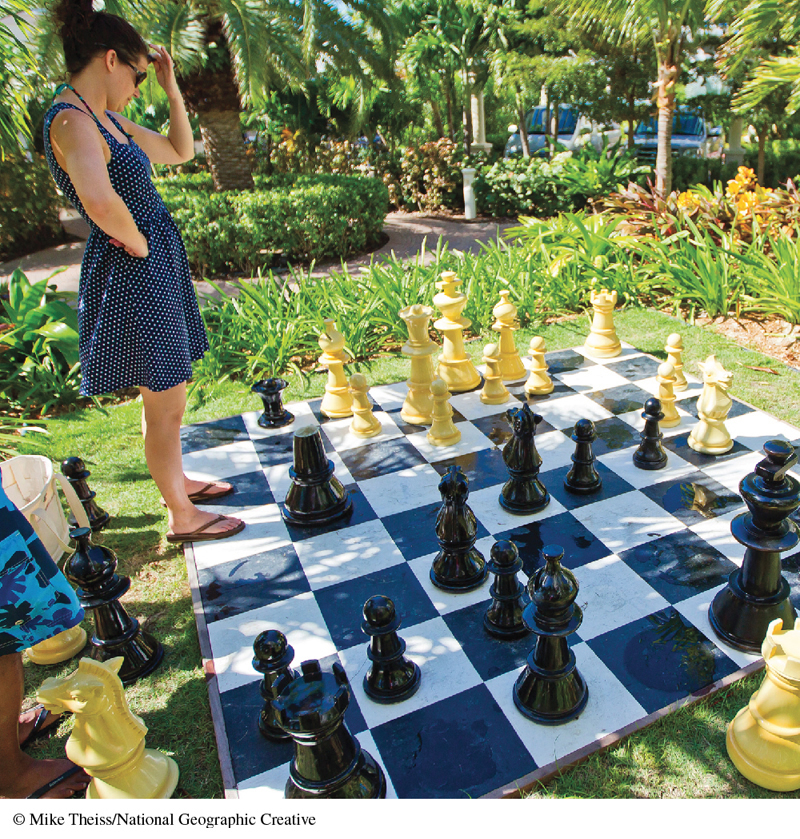Chapter Introduction
2
Thinking
Critically and
Setting Goals

21
Build Your Critical Thinking Skills
Use Bloom’s Taxonomy
Think Critically to Set Goals
Create Your Personal Success Plan
Critical Thinking and Goal Setting in Your Career
22
Everyone thinks, but not everyone thinks critically — that is, in a careful, unbiased way. Take Christopher, a first-year student majoring in criminology who wants to become a forensic crime-scene investigator. He’s watched a lot of crime shows and visited several Web sites related to crime-scene investigation, so he’s sure he’s found the perfect path for him. He believes that majoring in criminology will prepare him for his dream job and that after he graduates, he’ll easily find work in his chosen field. He also expects that he’ll work in exciting locations, interact regularly with police and witnesses, and make lots of money.
But if Christopher thought critically about his choices, he would realize that his assumptions were off base. For one thing, many forensic specialists start out as forensic science technicians and major in chemistry or biology — not in criminology. Moreover, technicians often work in laboratory environments and interact mostly with other scientists and technicians — not with police and witnesses. Starting salaries for technicians are modest, often less than $45,000 a year. Finally, according to the U.S. Department of Labor, job growth for forensic specialists is slower than the national average for all occupations.1
These facts don’t mean that Christopher shouldn’t pursue his interests — he may do so and have a successful, rewarding career. But he does need to think critically about his goals and expectations using accurate information — not TV shows. Critical thinking will help him make informed decisions based on solid facts and analysis.
In fact, critical thinking is a fundamental element of success in college and the workplace, and that’s why we highlight it in this chapter and address it throughout the rest of this book. Critical thinking helps you learn new course content so that you can succeed academically. It also helps you learn about yourself so that you can set meaningful personal goals. In addition, it helps you keep learning and growing as an employee and sets you up for workplace success: Most employers highly value strong critical thinking skills.
In this chapter you’ll explore how critical thinking influences your learning (spoiler alert: it helps you learn more deeply) and how it helps you set goals. You’ll also try out the Personal Success Plan, a tool you can use to map out your goals and build a plan for achieving them. Finally, you’ll discover how necessary critical thinking is in whichever career you decide to pursue.
23
Reflect
On Your Critical Thinking and Goal Setting
Self-knowledge gives you the power to make positive change. That’s why you’re using the Academic and Career Excellence System (ACES): to learn more about your strengths and areas where you could improve. By knowing what you’re good at, you can use those skills to master course content and build other skills. By acknowledging your weaknesses, you can target areas for improvement.
At the beginning of most chapters in this book, you’ll review your score on the related section of ACES. Then you can use that information to focus on the chapter content that will best help you become a stronger student.
Let’s start: Retrieve your Critical Thinking and Goal Setting score on ACES by clicking here. This score measures your beliefs about how well you think critically and set goals. How do you feel about your score? Do you think it accurately reflects your skills? No matter what your score is, you can use the results to become a more effective critical thinker and goal setter. Here’s how to act on what you’ve learned about yourself.
IF YOU SCORED IN THE HIGH RANGE on ACES, strengthen your strengths. Take pride in your results, but remember that even if you’re good at something, you can always build up that skill even more. A swimmer might win first place at a swim meet, but she’ll be back at practice the next morning to improve her time and refine her stroke. That way, she can keep working toward her goal of competing against more advanced swimmers. As you read this chapter, use what you learn about your strengths to build them up even more — so you can further expand your learning in every course.
IF YOU SCORED IN THE MODERATE OR LOW RANGE on ACES, don’t worry; instead, target ways to improve. You’ll have many opportunities to build your skills in this chapter and throughout the term. Can you think of an activity that you found difficult the first time you tried it but that you got better at with practice? The same is true here: Many people don’t have well-developed critical thinking and goal-setting skills at first, but they get better at these skills with practice. This chapter shows you how.
MY ACES SCORE
HIGH
MODERATE
LOW

To find your Critical Thinking and Goal Setting score, go to the LaunchPad for Connections.
The Academic and Career Excellence System (ACES) is an empirically developed measure of student strengths that yields scores on twelve scales corresponding to the major topics of Chapters 2 through 13. Assign ACES during the first week of class so your students can review and reflect on their scores as they start each chapter. Within ACES, general recommendations are offered to students based on their scores, and there are user manuals for both students and instructors on the LaunchPad for Connections. Students can also use their scores to define a goal at the end of each chapter by creating a Personal Success Plan.
24